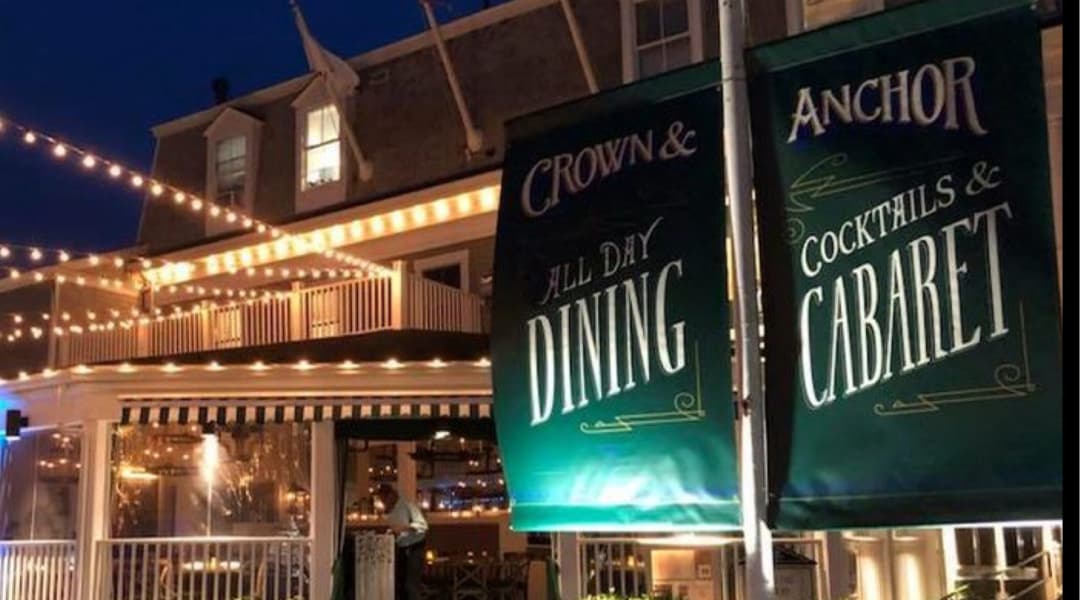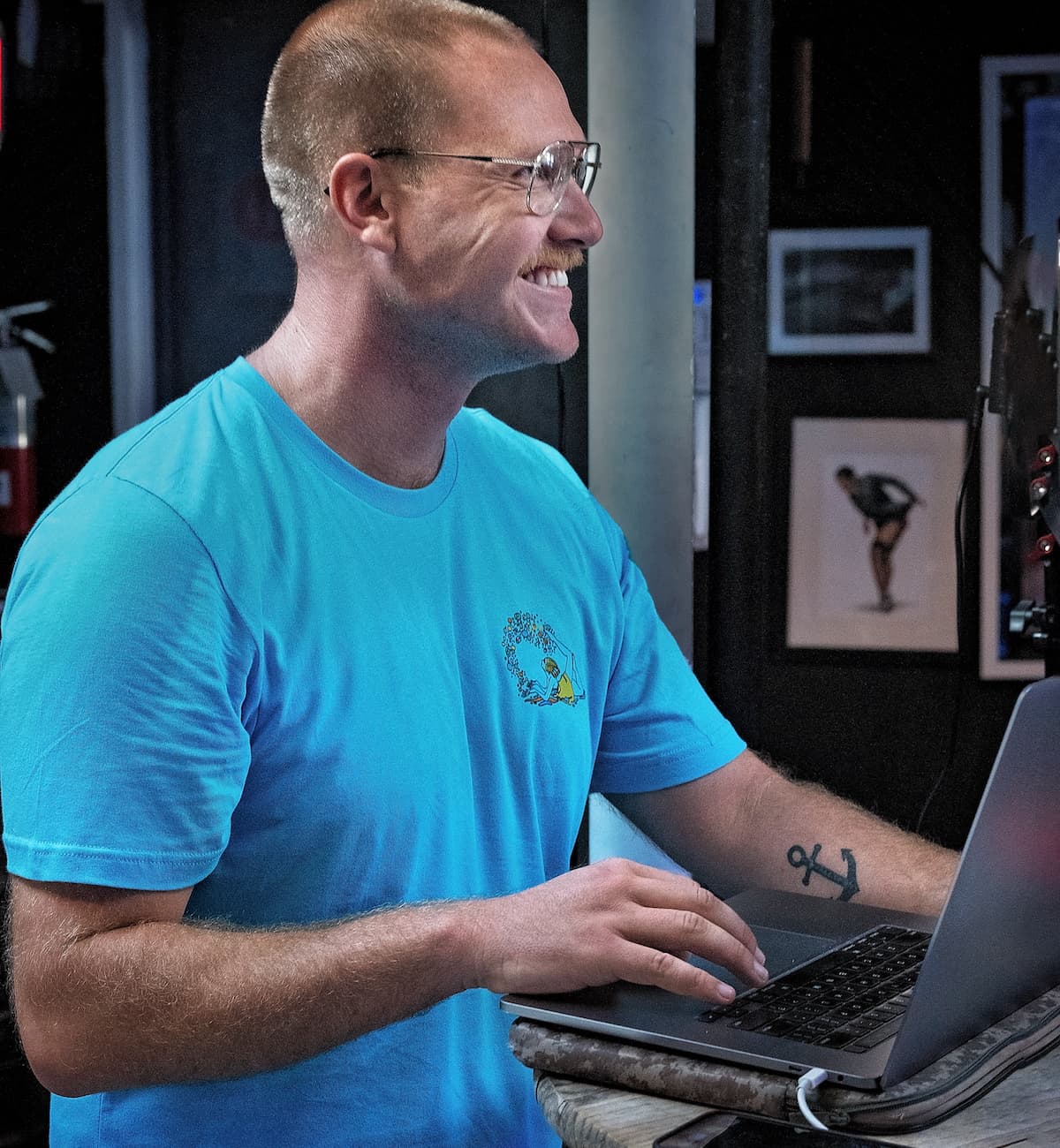
The Crown & Anchor Has a New Owner Who Wants to Change How Ptown Does Nightlife

Jonathan Hawkins spent his first summer in Provincetown strutting down Commercial Street in his speedo hawking tickets for his friend’s one-woman show and singing opera in his underwear.
Eight years later, he’s the new co-owner of Crown & Anchor, one of Provincetown’s most iconic nightlife venues. A working producer and vocalist, Hawkins never envisioned settling in one place. He’s spent most of his life shuffling between the coasts, keeping residences in New York, Los Angeles and Fort Lauderdale.
But if Hawkins is going to live somewhere, Provincetown would be the place. It always manages to bring him back. That first summer, Hawkins thought he would only be around for a week. He wound up staying through August.
At the onset of Covid, Hawkins and his husband, Paolo Martini, who’s a chief scientific officer at Moderna, moved back to Ptown to ride out the pandemic. They haven’t left.
When Hawkins was presented with a second chance to buy the Crown, it was an offer he couldn’t refuse.
“When the opportunity to purchase the Crown came up again, there was not a doubt in my mind this was what I was supposed to do,” he said.
Hawkins arrived in Provincetown as an entertainer, but quickly became involved in the booking side of things, too. He worked at the Crown for seven years under previous owners Bill Dougal and Rick Murray, learning everything about the historic institution, and Ptown’s hyper-competitive entertainment scene. Back in 2019, he came up for the whole summer and worked as Murray’s assistant to see if he wanted to take over. But at that point, Hawkins was still a traveling singer. He wasn’t ready yet.

Now he is, and his first order of business is opening up Provincetown to a new generation of queer performers.
“There are artists who have no idea about Provincetown, and they don’t even know such a place of this magic exists,” Hawkins said. “I had no idea working as a queer cabaret singer was even an option. There are countless queer individuals from around the world who would thrive in this kind of environment.”
Hawkins can speak confidently about these things, because he’s lived the experience. He knows what it’s like to promote your show all week (with speedo) and only sell 50 tickets; he understands how challenging it is to break into the cutthroat scene. That’s why he’s dedicated to making the Crown, and all of its various stages, a land of opportunity.
“I want to change the way entertainment is sold and produced here,” he said. “I want it to be more immersive, I want it to far more diverse, a lot more queer, and I want to introduce Provincetown to a new generation of queer talent, and introduce a new generation of queer talent to Provincetown.”
The old ways of doing business aren’t going to work anymore, Hawkins says. Over the last couple of years, he’s seen what can happen when everyone works together. That first Covid summer, Hawkins built an outdoor theater and started the Provincetown Performing Arts Fund. The project raised $85,000 for local artists in need.
“I think there was a mentality in the past of, ‘if that person is successful, I can’t be successful,’ or ‘if that venue is doing that, then I don’t want to copy and do that exact same thing,’” he said. “Something the last few years has shown us is that that model no longer works.”
In its place, Hawkins sees a Provincetown in which promoters and performers work in concert with one another, referring acts to different venues and trying to uplift the entire industry. That’s how they’ve survived these dreadful Covid years.
“Over the last couple of years, the community was forced to come together in order for us to survive, and this beautiful sort of organic culture blossomed, and allowed for so many young local talents tor really flourish,” he said.
Young people and new talent bring the creativity and downright weirdness, which Provincetown risks losing along with all of its affordable housing.
Up-and-coming artists just need a stage. Luckily, Hawkins has several.
“My goal here is to be represented and celebrated. That means we’re honoring the tradition of what this space is and has been for 50 years, but also elevating the experience, and making sure a younger generation of our queer community feels welcomed,” he said. “That’s a big problem with Provincetown. We’re doing everything we can to keep it accessible, to keep it young, to keep it fresh, to keep it queer. If we don’t do that, eventually the soul of the town is slowly going to die.”
More Recent Provincetown News




 Accommodations
Accommodations  Art
Art  Bars
Bars  Books
Books  Entertainment
Entertainment  Events
Events  Featured
Featured  Guides
Guides  History
History  Literary stuff
Literary stuff  Most Popular
Most Popular  Provincetown News
Provincetown News  Restaurants
Restaurants  Reviews
Reviews  Shopping
Shopping  Theatre
Theatre  Uncategorized
Uncategorized  Weed
Weed